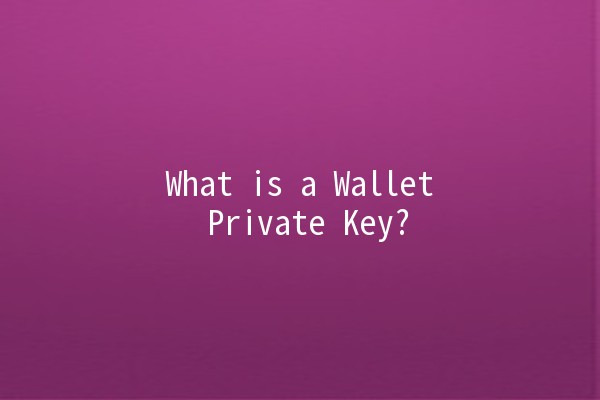
In the world of cryptocurrencies, understanding the nuances of digital wallets is crucial for both new and experienced users. One of the most important concepts connected to cryptocurrency wallets is the private key. This article delves into what a wallet private key is, its relevance, the security mechanisms surrounding it, and practical tips for managing private keys effectively.
Understanding the Basics of Wallets and Private Keys
What is a Wallet?
A cryptocurrency wallet is a digital tool that allows users to store, send, and receive cryptocurrencies such as Bitcoin, Ethereum, and many others. Unlike a traditional wallet, a cryptocurrency wallet doesn’t store physical cash; instead, it houses the public and private keys required for transactions on the blockchain.
What is a Private Key?

In simple terms, a private key is a secure digital code that allows you to access your cryptocurrency holdings. It serves as a password that gives you complete control over your assets. If someone gets access to your private key, they can access your wallet and transfer your cryptocurrencies without your permission. Thus, protecting your private key is vital to ensuring the security of your digital assets.
Public Key vs. Private Key
To grasp the importance of a private key, it is helpful to understand its relationship with a public key.
Public Key: Think of it as your bank account number, which you can share with others to receive funds.
Private Key: This is akin to your bank password; it must be kept secret, as it gives you the authority to access and manage your funds.
Importance of Private Keys in Cryptocurrency Transactions
The functioning of cryptocurrencies hinges on the concept of decentralization, meaning no central authority controls them. As such, private keys become a critical security feature.
Best Practices for Managing Your Private Key
To ensure the security of your digital assets, consider the following tips for managing your private keys effectively:
A hardware wallet is a physical device designed to store your private keys offline, making it much harder for hackers to access.
Practical Application: When setting up your cryptocurrency holdings, consider purchasing a reputable hardware wallet such as Ledger or Trezor. This will safeguard your private keys from online threats.
Twofactor authentication adds an extra layer of security by requiring two forms of identification before accessing your wallet.
Practical Application: If your wallet provider supports 2FA, enable it immediately. This typically involves receiving a onetime password (OTP) on your mobile device or email that must be used alongside your password for access.
Regularly backing up your private key or seed phrase ensures you won’t lose access to your assets.
Practical Application: Write down your private key and store it in a secure, fireproof location, separate from your devices. Some users also opt for safe deposit boxes for their backups.
Software wallets, while convenient, are more susceptible to malware and hacking attempts.
Practical Application: If you use a software wallet, ensure it’s from a reputable provider, always keep your software updated, and conduct regular security assessments on your device.
Phishing attacks can come in various forms, often tricking users into revealing their private keys.
Practical Application: Always verify the authenticity of links and emails from wallet providers. Avoid clicking on suspicious links and educate yourself on common phishing tactics to reduce your risk of falling prey.
In addition to securing your private key, it’s crucial to have strong, unique passwords for your cryptocurrency accounts.
Practical Application: Utilize password managers to generate and securely store complex passwords, ensuring that they are difficult for others to guess.
Understanding what a wallet private key is and how to manage it is foundational for anyone engaging with cryptocurrencies. With the increasing popularity of digital assets, protecting your private key with robust security measures is crucial to safeguarding your investments. By employing hardware wallets, enabling twofactor authentication, backing up your keys, utilizing secure software wallets, being vigilant against phishing attacks, and maintaining strong passwords, you can significantly reduce the risk of your assets being compromised.
Frequently Asked Questions
What happens if I lose my private key?
If you lose your private key, you lose access to your cryptocurrency permanently. There is no way to recover a lost key, as cryptocurrencies operate on a decentralized network.
How can I tell if my private key has been compromised?
If you notice unauthorized transactions from your wallet or receive any suspicious alerts from your wallet provider, it’s wise to assume that your private key has been compromised. Act quickly to transfer your assets to a new wallet.
Can I have multiple private keys for one wallet?
Typically, a wallet has one private key that allows access to your cryptocurrency. However, some wallets use a hierarchical structure, enabling you to generate multiple keys for diverse accounts but still connect to the same wallet.
Is it safe to store my private key in the cloud?
Storing your private key in the cloud is highly discouraged due to increased risk of hacking. If you prefer digital storage, consider using encrypted USB drives or hardware wallets for maximum security.
What should I do if I think my wallet has been hacked?
If you suspect your wallet has been hacked, immediately transfer remaining funds to a new wallet with a new private key. Contact your wallet provider to secure your account and report the incident.
Are private keys the only way to access my cryptocurrencies?
While private keys are the primary method for accessing and managing cryptocurrencies, some wallets offer recovery phrases. These allow you to regain access if you lose your private key, as long as you keep the phrase secure.
By understanding these foundational aspects surrounding private keys, users can navigate the complex landscape of cryptocurrency with greater confidence and security.

